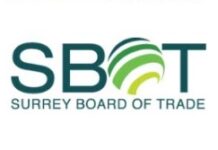
Photo by Chandra Bodalia
THE Surrey Board of Trade wants the federal government to reinstate the mandatory long-form census questionnaire in the 2016 census.
In a policy resolution to the federal government, the Surrey Board of Trade indicates that in April 2014, Statistics Canada announced that it is gearing up for the 2016 Canadian Census. As in 2011, there will be a short, mandatory census questionnaire for all Canadians, and a voluntary household survey for 1 in 3 households.
In 2010, over the objections of a very broad sector of society, the federal government abolished the mandatory long-form census questionnaire, in favour of a voluntary National Household Survey. The impetus for the change was reported to be over concerns for the privacy of individuals that submit the questionnaire. It has been reported that security of the data, particularly concerning personal privacy, is very high.
“However, there are no indications that any census information gathered had been compromised nor individuals’ privacy put at risk,” said Anita Huberman, CEO, Surrey Board of Trade.
Over the past year, Statistics Canada has been releasing information based on the census conducted without this tool. This has resulted in a storm of questions about the reliability of the data collected especially when compared with previous census data. According to a Canadian Press report, the agency (Statistics Canada) viewed the results as good for its first voluntary survey, but noted that the numbers were less reliable when focusing on areas with fewer than 25,000 people. In fact while Statistics Canada did increase the number of households that received the survey (1 in 3 from 1 in 5) the response rate was only 68% as opposed to the 94% rate when submitting data was mandatory.
At the annual Convention and AGM of the Canadian Chamber of Commerce in September 2014, this Surrey Board of Trade policy resolution was approved by the Canadian Chamber’s member chambers of commerce and boards of trade, representing 200,000 Canadian businesses. This resolution is now a policy position of the Canadian Chamber of Commerce and its members and will be pursued with the federal government over the coming months by both the Surrey Board of Trade as well as the Canadian Chamber of Commerce.
Reasons for implementation of Canada’s mandatory long-form census:
- Long‐form data are used by businesses, provinces and municipalities, economists, urban and community researchers, policy analysts, sociologists, and other scholars in the humanities and social sciences (including geographers and historians). They all rely on the mandatory long-form census for solidly representative and accurate data.
- The loss of comparable, longitudinal, long‐form data seriously impairs our ability to monitor change in the social indicators that inform policies and programs related to immigrants, visible minorities, the poor, ethnic groups, Aboriginal peoples, persons with disabilities, or women (e.g. the value of unpaid work in the home).
- Municipalities (including large cities) and even provinces cannot gather such high quality, comprehensive, and reliable or truly representative data themselves. Not only would their costs be prohibitive but, unlike the federal government, they cannot make their surveys mandatory.
- When we are still climbing out of a recession and relying heavily on immigration for population and labour force growth, we cannot afford to jeopardize our ability to gather high quality, accurately representative data on a range of social and economic indicators that measure adaptation by immigrant groups.
- The federal government’s decision to cancel the mandatory long‐form census (Form 2b) and to replace it with the voluntary National Household Survey—effectively undermines their commitment to research excellence and innovation.
For the full position paper, go to www.businesinsurrey.com












